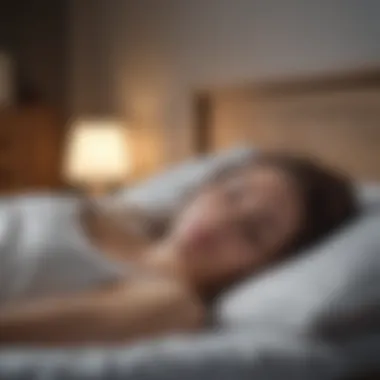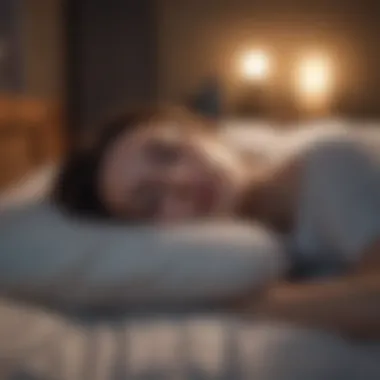Effective Strategies for Achieving Restful Sleep


Understanding Mental Health and Well-being
Mental health plays a vital role in quality sleep, highlighting the deep connection between our state of mind and our sleeping patterns.
What is Mental Health?
Mental health encompasses our emotional and psychological well-being and determines our thoughts, feelings, and behaviors. Central to how we manage stress, build relationships, and make choices, mental health directly impacts various aspects of life. Optimizing this aspect can be fundamental for better sleep.
The Importance of Prioritizing Mental Well-being
Prioritizing mental well-being is crucial for enjoying a fulfilling life. Good mental health enables individuals to realize their full potential and cope with everyday stressors. Enhancing mental wellness directly correlates with improved sleep, as people with a stable mindset typically have healthier sleep routines.
Common Mental Health Challenges and Disorders
Mental disorders, including anxiety and depression, are common barriers to restful sleep. These conditions may disrupt sleep routines, increasing insomnia cases and affecting overall health adversely. Understanding these challenges helps in addressing them effectively and improving sleep patterns simultaneously.
Strategies for Improving Mental Health
Self-care Techniques and Practices
Engaging in self-care is essential for enhancing mental health. Engage in activities that fulfill you, from hobbies to physical activities. Creating a routine that incorporates these practices will foster a conducive mental state which, in turn, promotes quality sleep.
Building Resilience and Stress Management
Stress management is paramount in today's fast-paced life. Building resilience enables individuals to face life challenges more effectively. Established techniques like mindfulness meditation or breathing exercises can mitigate stress levels, consequently leading to better sleep.
Seeking Professional Help: Therapy and Counseling
If self-help on mental health seems insufficient, consider professional help. Therapy and counseling can guide you in navigating emotional challenges systematically. Understanding complex emotional patterns with an expert leads to clarity and, ultimately, better sleep itself.
Finding Balance in Life
Healthy Lifestyle Choices: Diet, Exercise, and Sleep
A balanced lifestyle impacts mental health significantly. Eating well, maintaining physical fitness, and establishing regular sleeping schedules enhance overall health. Striving for balance across these domains leads gradually to improved sleep quality and mental health.
Mindfulness and Meditation Practices
Garnering mindfulness makes the mind clearer. Introducing meditation into your daily routine, even briefly, can yield palpable benefits. Over time, practicing mindfulness cultivates patience and mental wellbeing while easing sleeplessness more effectively.
Setting Boundaries and Managing Time Effectively
Learning to set boundaries protects mental energy and resources. Practicing effective time management facilitates a life structure that reduces stress. Devote yourself to prioritizing the significant relationships and tasks allowing for ample rest as needed.
Enhancing Personal Development
Goal Setting and Productivity Tips
Establishing clear, actionable goals generates momentum and purpose. This daily drive cultivates productivity, translating into positive impacts on sleep schedules. Workplace satisfaction further reinforces nighttime serenity, creating habitual turn toward restful sleep.
Building Healthy Relationships and Social Connections
Fostering a supportive circle enhances mental health. Interpersonal relationships combat loneliness effectively and promote emotional resilience, creating frames for discussion. A socially connected life each contributes to clam nights of sleep.
Practicing Gratitude and Positivity
Genuine gratitude leads to higher emotional stability. Embracing positivity through journals or plain reflection of experiences produces elevated mental well-being levels, fostering an environment where one can ultimately sleep better.
Tips for Maintaining Mental Well-being
Strategies for Preventing Burnout
Recognizing burnout symptoms early fosters effective preventive care. Adopt strategies such as prioritizing self-care practices or maintaining fulfilling hobbies to rejuvenate mentally and physically, paving the way for successful sleep experiences.
Coping with Challenges and Setbacks


Flexibility should be maintained across life challenges or setbacks. Incorporating healthy coping techniques like seeking interpersonal support creates pathways for resolve. Embracing stability gets translated into a peaceful sleep experience at night.
Creating a Supportive Environment
Developing a constructive environment encourages mental health enhancement. Clarity about daily demands or inviting positivity into social surroundings endorse emotional health, naturally allowing for peaceful and deep sleep where every element synergizes.
Understanding the Importance of Sleep
Understanding the importance of sleep is crucial for anyone wanting to optimize their life. Sleep acts as a cornerstone for both mental and physical health. It is not simply a time for the body to rest, but a complex biological process influencing mood, cognitive performance, and overall well-being. Adequate sleep is intrinsically linked to improved focus, higher productivity, and a stable emotional state.
The benefits of sleep extend beyond mere rest. Sleep helps the brain clear out toxins that accumulate during the day. It also plays a critical role in memory consolidation, allowing the mind to catalog and store information effectively. Challenges to your sleep quality can disrupt this process, impacting the ability to learn and retain new information.
Here are some factors highlighting why sleep is vitally important:
- Mental Clarity: Better sleep helps in sharper decision making and creative thinking.
- Emotional Stability: A well-rested mind is more adept at processing emotions and reducing feelings of anxiety.
- Physical Health: Sleep helps to regulate metabolic functions and supports system recovery, including immune response.
People who undermine the necessity of sleep often neglect its fundamental role in everyday life. By helping readers understand these elements, the foundation is laid for exploring actionable techniques to improve sleep patterns ultimatively contributing to greater overall health.
Environmental Considerations for Sleep
Creating a suitable environment for sleep is a fundamental step towards achieving better rest. Environmental factors significantly impact sleep quality. Characteristics like light, sound, temperature, and the general arrangement of your sleep area can foster a profound influence on one’s ability to fall and stay asleep. Thus, it is crucial to evaluate and refine these elements to enhance the overall sleep experience.
Optimizing Your Sleep Space
Choosing the Right Mattress and Pillow
Having the correct mattress and pillow can dramatically affect sleep. This aspect of the sleep environment focuses on comfort and body support. A mattress that supports the natural curve of the spine can reduce pressure points. Memory foam and pocket-spring options are often recommended as these materials typically accommodate a variety of sleeping positions.
Key characteristics of a suitable mattress include firmness, durability, and material composition. The mechanics of temperature regulation in some mattresses can also add extra value. However, there are drawbacks. Some materials can retain heat, which may not suit all sleepers. Hence, choosing wisely often leads to more refreshing and restorative sleep.
Controlling Light and Noise Levels
Controlling light and noise levels is vital to cultivating a conducive sleep environment. Light exposure before bedtime can disturb natural sleep-wake cycles. Reducing blue light from devices is particularly effective. Installing blackout curtains can give added benefits by minimizing excess light from outside. Noise, too, can be a problematic concern—unwelcome sounds can lead to disturbed slumber, significantly reducing sleep quality. Additionally, using white noise machines or earplugs can help achieve some peace from external disturbances.
Finding a balance in these factors contributes significantly to overall sleep hygiene. While customizing an environment can take time, simple adjustments can lead to drastic improvements.
The Impact of Temperature on Sleep Quality
Temperature serves as both a disruptor and an enhancer of sleep quality. Humans naturally experience fluctuations in body temperature throughout the night. A room that is too warm can increase wakefulness and decrease sleep duration. On the other hand, a cooler temperature has proven conducive to deeper sleep stages. Most experts suggest maintaining a room temperature of around 65°F (18°C), but it might vary depending on individual preferences. Consideration for bedding fabrics is important as well; breathable materials such as cotton or linen may help regulate body temperature. Adjusting not just the thermostat, but also blankets and sheets can optimize overall sleep comfort.
Pre-Sleep Rituals and Routines
Pre-sleep rituals and routines can have a significant impact on sleep quality. They help signal to the body that it is time to wind down and prepare for rest. Establishing a consistent routine aids in stabilizing the internal body clock, leading to more restorative sleep. When nighttime rituals are in place, falling asleep can become easier, while obstructive thoughts lessen.
Establishing a Consistent Sleep Schedule
Creating a consistent sleep schedule is critically important. This method integrates sleep habits and sets the body's expectations. Going to bed at the same time each night, as well as waking up at a fixed hour, can regulate the sleep cycle. This regularity encourages deeper and more continuous sleep. Even on weekends, try not to stray too far from this schedule to maintain balance.,
Relaxation Techniques Before Bed
Incorporating relaxation techniques before bedtime can enhance sleep quality significantly. These techniques enable the mind and body to transition from a state of activity to restfulness.
Meditation and Mindfulness
Meditation and mindfulness play a notable role in improving sleep. Focused attention techniques can help in reducing racing thoughts commonly associated with anxiety. Mindfulness, by its nature, elevates present moment awareness, allowing one to disengage from stressors of the day. Many find meditation to be a profound yet easily accessible practice. Its adaptability makes it a popular choice. The unique aspect is that it can be performed anywhere, with minimal requirements. Though benefits are remarkable, some may find it challenging initially to quiet their minds. Nonetheless, like practiced habits, the rewards gained almost always outweighs the initial inconvenience.
Deep Breathing Exercises
Deep breathing exercises are another beneficial option within pre-sleep rituals. This technique engages the diaphragm, promoting a systemic release of tension. By inhaling deeply and exhaling fully, it encourages blood flow and optimal oxygen dispersal throughout the body. The key characteristic here is simplicity; anyone at any skill level can adopt this method. Deep breathing is highly beneficial, particularly for individuals looking to actively reduce anxiety. Nevertheless, people with specific respiratory issues should consult a professional beforehand, as it activates increased breathing patterns which may not be suitable for all.
Progressive Muscle Relaxation
Progressive Muscle Relaxation (PRM) is another noteworthy technique for balanced bedtime routines. This practice involves tensing and relaxing different muscle groups systematically. The cycle allows individuals to notice physical sensations associated with tension and relaxation. Its key characteristic is the somatic engagement it promotes, leading to deep relaxation. This method can also assist in individuals recognizing stress signals in themselves.
While PRM is beneficial in a direct manner toward sleep enhancement, it does require sustained commitment to mastering effective execution. In general, this technique is ideal for people looking to refine their awareness of their body’s physical state. With these simple but profound pre-sleep rituals, there can be significant improvements to overall sleep quality and mental well-being.
Remember: A consistent pre-sleep ritual is an essential step towards achieving restorative sleep, fundamentally improving both your physical and mental health.
Dietary Influences on Sleep Patterns


Diet plays a significant role in shaping sleep quality. The foods we consume can either ease us into a restful night or disrupt our ability to achieve deep sleep. Understanding the impact of diet on sleep is essential for those looking to improve their overall mental health and wellness. Nutrition influences multiple biological processes, including hormone regulation, and can either enhance or hinder sleep.
Dietary habits contribute significantly to sleep onset and duration. Ideal choices include nutrients that support serotonin and melatonin production, both critical for promoting sleep. Limiting intake of sleep-inhibiting foods also merits consideration.
Foods That Promote Sleep
Certain foods are beneficial in promoting sleepiness and improving overall sleep quality. For instance, foods rich in magnesium, like spinach, nuts, and legumes, can help relax muscles and nervous system.
Here are some effective foods to consider:
- Cherries: They are one of the few natural sources of melatonin, providing a simple and tasty way to improve sleep.
- Bananas: They contain potassium and magnesium, which act as natural muscle relaxants.
- Fatty fish: Salmon, mackerel, and sardines are not only rich in omega-3 fatty acids but also vitamin D, both beneficial for sleep health.
- Oatmeal: This hearty meal is rich in carbohydrates that can stimulate the insulin effect, providing the tryptophan needed for sleep.
- Walnuts: They provide healthy fats and also have melatonin, assisting in smoother transitions to sleep.
Implementing these options in evening meals can make a positive difference in sleep patterns and spaces within the body can be re-energized through better sleep. Bear in mind that to achieve the best results, a well-balanced, overall diet must be prioritizd alongside such foods.
Caffeine and Alcohol Consumption
The impacts of caffeine and alcohol on sleep are noteworthy. Despite their widespread consumption, both substances can disrupt the natural sleeping processes, with long-lasting effects on quality.
Caffeine
Caffeine is a stimulant present in coffee, tea, chocolate, and some medications. It blocks adenosine, a neurotransmitter inversely related to wakefulness. Consuming caffeine too close to bedtime can prevent falling asleep or lead to disrupted sleep intervals.
- Experts recommend limiting caffeine intake during afternoon and evening. Ideal timing to steer clear is about six hours prior to sleeping.
- Additionally, awareness of “hidden” caffeine in sodas and energy drinks is critical, as they can also interfere with sleep.
Alcohol
Alcohol, though able to induce drowsiness initially, strips natural sleep cycles of their restorative qualities. While it may lead to faster sleep onset, research indicates it leads to increased awakenings during the night, disrupting REM cycles.
To enhance sleep:
- Limiting alcohol consumption significantly may improve nighttime rest.
- Better alternatives for relaxation are herbal teas like chamomile, which possess calming properties without adverse effects.
Overall, being mindful of food and drink choices, particularly before sleep, is vital. Modifications in these patterns are among the simplest, yet impactful strategies for acheiving better sleep.
Technology and Sleep
In an age where technology permeates every aspect of life, its interplay with sleep has become increasingly crucial. Understanding the influence of technology on sleep can empower individuals to make informed choices, improving their overall rest quality. With the prevalence of smartphones, tablets, and laptops, the implications of technology on sleep routines and patterns deserve attention. Research demonstrates that excessive screen time, especially before bedtime, can significantly disrupt sleep cycles, affecting mental and physical well-being.
The Influence of Screen Time on Sleep Quality
Screen time impacts sleep quality primarily through the emission of blue light. Devices such as smartphones and computers emit high levels of this light, which has been shown to suppress melatonin production. Melatonin is the hormone responsible for regulating sleep-wake cycles. When melatonin levels are lower, falling asleep becomes more difficult. Studies confirm that individuals who engage with screens right before sleeping tend to experience increased latency to fall asleep and shorter sleep duration.
Additionally, engaging in stimulating activities on these devices, like browsing social media or playing video games, can elevate heart rates and cognitive activity. Thus, the brain remains alert instead of shifting into a state conducive to sleep. This component forms the basis for a problematic loop where lack of sleep discourages effective daily functioning, leading to reliance on technology for relief or distraction.
To foster better sleep patterns, consider these implications:
- Increase awareness of device use and its effects. Users indicate that checking notifications or watching videos notably affects their sleep quality.
- Prolong screen time close to bed leads correlated sleep delay. Insights gather by surveys pointed towards delayed bedtimes as a major hit to sleep duration.
A 2022 study suggests that reducing screen time by even one hour each night can lead to significant improvements in sleep quality.
Managing Technology Usage Before Bed
To mitigate the negative impact of technology on sleep, establishing healthy technology usage habits becomes vital. The key is to create barriers and alternative routines before bedtime. Here are practical strategies to consider:
- Set a digital curfew. Designate a specific time, ideally one hour, before going to bed where all screens are turned off. This gives the body a chance to unwind without stimulation.
- Use applications that reduce blue light exposure. Many devices now offer settings that adjust light emission based on the time of day. Activating these options can reduce harsh lighting without altering screen usage habits too much.
- Engage in calming activities instead. Consider reading a physical book, practicing meditation, or journaling. Real interactions or hobbies can distract from goddess-like staring into screens.
- Place devices out of reach. The physical distance from smartphones or tablets during night hours encourages a detachment from the compulsion to engage openly, leading to better sleep initiation.
Establishing a balanced relationship with technology and understanding its sleep implications will ultimately cultivate an environment that promotes restful, restorative sleep.
Physical Activity and Sleep
Physical activity plays a key role in sleep quality, making it an important topic in understanding restful nights. Regular exercise not only promotes physical health but can also significantly impact mental well-being. Research indicates that individuals who engage in consistent physical activity tend to experience deeper and more restorative sleep.
Several specific elements underlie this relationship:
- Reduction of Anxiety and Stress: Exercise triggers the release of endorphins and other neurotransmitters that curb feelings of anxiety. By diminishing these sensations, individuals find it easier to relax and prepare for sleep.
- Improved Sleep Architecture: Individuals who regularly exercise typically experience improved overall sleep architecture with longer durations of deep sleep. This stage of sleep is essential for recovery and restoration, providing physiological gains necessary for health.
However, there are several considerations individuals should be aware of in their pursuit of better sleep through physical activity. Not all forms of exercise are equally beneficial at all times.


Regular moderate exercise can enhance sleep but timing is significant. Just because exercise is largely helpful does not mean it should be done recklessly or at any time of day.
The Relationship Between Exercise and Sleep Quality
The correlation between exercise frequency and sleep quality is well-documented. Various studies support the idea that physical activity not only assists in falling asleep faster but also allows individuals to have more effective sleep overall.
- Exercise Reduces Sleep Onset Latency: Engaging in physical activity can lead to a quicker time in falling asleep. This state is aptly named
Mental Health and Sleep
Mental health plays a crucial role in determining the quality of sleep a person experiences. Understanding the interaction between mental health and sleep helps in creating effective strategies for improving overall well-being. Disturbed sleep patterns often arise from mental health issues such as anxiety, depression, or even stress. These issues can create a negative feedback loop, where poor sleep exacerbates mental health conditions, leading to further complications.
Quality sleep is not simply a luxury. It is a vital component of good mental hygiene. Sleep deprivation can lead to a lower tolerance for stress, impaired decision-making abilities, and heightened feelings of anxiety and depression. Moreover, restorative sleep is integral for the brain to perform essential functions like memory consolidation and emotional regulation. Without this, individuals may struggle to cope with daily challenges effectively.
How Anxiety and Stress Affect Sleep
Anxiety is one of the most common barriers to achieving restful sleep. High levels of anxiety can lead to racing thoughts, making it difficult to fall asleep or maintain sleep throughout the night. People often lay awake, consumed by worry, which only adds to the stress. This creates a cycle where anxiety impairs the ability to sleep, and lack of sleep increases anxiety levels.
Symptoms contributed by anxiety can manifest physically, leading to restlessness, increased heart rates, and tension. These issues, when combined with stress, create further frustration that keeps a person trapped in a pattern of sleeplessness. Recognizing this cycle is crucial for those dealing with anxiety, especially when providing support to someone else who is experiencing the same challenge.
Key strategies can help mitigate this problem, including:
- Establishing a worry journal
- Exploring cognitive reframing techniques
- Implementing relaxation methods before bedtime
Cognitive Behavioral Techniques for Better Sleep
Cognitive Behavioral Therapy (CBT) has proven effective for addressing a range of sleep problems. This approach focuses on identifying and changing negative thought patterns that impact sleep quality. By replacing these damaging thoughts with constructive alternatives, individuals can reduce anxiety levels that hinder sleep without needing medication.
Specific techniques in CBT program include:
- Cognitive restructuring: Educating patients on recognizing unhelpful thoughts linked to sleep, such as “I’ll never be able to sleep.” Challenging these thoughts and replacing them with more rational viewpoints is essential.
- Sleep Hygiene Education: Teaching effective habits surrounding sleeping from creating a comfortable sleep environment to maintaining a proper sleep schedule.
- Behavioral interventions: Techniques like sleep restriction, where time in bed is limited to increase sleep drive.
By incorporating these methods, individuals can empower themselves to achieve better mental health, improving their ability to sleep, breaking free from unproductive cycles.
Sleep Disorders and When to Seek Help
Sleep disorders pose a significant hurdle for individuals striving to achieve restorative rest. Understanding these disorders is integral to recognizing when expert intervention is necessary. It is not merely about feeling tired; persistent sleep issues can indicate underlying health problems. Addressing disorders effectively contributes to holistic well-being.
Common Sleep Disorders
Insomnia
Insomnia is characterized by difficulty falling asleep or staying asleep. It often leads to daytime fatigue, affecting mental sharpness and emotional stability. This is significant, as chronic insomnia can lead to further health complications, such as anxiety or depression. Insomnia's unique feature lies in its prevalence; it is commonly experienced across various demographics, making it a relatable concern. The great disadvantage of insomnia is the possibility of it's becoming a recurring cycle, as the anxiety about sleep can exacerbate the condition.
Sleep Apnea
Sleep apnea involves interruptions in breathing during sleep. This condition typically manifests through loud snoring and disrupted sleep, leading to erratic sleep patterns. This is a detrimental condition which often goes undiagnosed. The key feature of sleep apnea is its potential to be menacing to overall health. Over time, untreated sleep apnea can cause cardiovascular issues, hypertension, and even increase the risk of stroke. While it can have serious health implications, advancements in diagnosis and treatment provide structured ways to manage it responsibly, thus making it a vital concern to present in this article.
Narcolepsy
Narcolepsy causes overwhelming daytime drowsiness and sudden attacks of sleep. Unlike insomnia or sleep apnea, narcolepsy is distinct due to its potential impact on daily function. Those with narcolepsy can experience disrupted nighttime sleep as well. The key characteristic of narcolepsy is the sudden and unpredictable nature of sleep, impacting personal safety and productivity. It invites considerable interest for it opens discussions about sleep management and supports for those suffering. This condition signifies the importance of tailored treatments, often leading individuals to seek medical advice promptly.
Consulting Healthcare Professionals
When sleep disorders persist, it is crucial to engage with healthcare professionals. They can work through symptoms to identify patterns needing attention. Individuals can receive a comprehensive diagnosis that may suggest medical testing or therapeutic interventions. Timely consultation can mean the difference between a persistent disorder and regaining functional, good quality sleep. Seeking help is an importantr step toward remedying sleep challenges and improving overall wellness.
The End: Cultivating Better Sleep Habits
Cultivating better sleep habits is crucial for improving overall well-being and health. Sleep is not just a period of rest; it is fundamentally linked to physical and mental health. This section synthesizes the variety of strategies offered throughout the article, reinforcing their interconnection for those seeking restorative sleep.
Integrating these strategies is vital. They are not mere tips but essential components of effective sleep hygiene. By persistently applying the ideas laid out here, individuals can gradually improve the quality of their nighttime rest.
Integrating Strategies for Holistic Improvement
Achieving better sleep requires a multifaceted approach. Each strategy has its unique benefits but works best when employed in tandem. Here are some considerations:
- Create a Sleep-Conducive Environment: Ensure your bedroom is dark, quiet, and maintained at a comfortable temperature. This includes choosing the right mattress and pillows. Environmental factors form the core of good sleep.
- Establish a Consistent Routine: Going to bed and waking up at the same time fosters a biological rhythm, making it easier to fall asleep and wake up naturally.
- Incorporate Relaxation Techniques: Engaging in mindfulness or deep breathing before sleep reduces anxiety, promoting quicker resting.
- Monitor Intake of Food and Drinks: Being aware of caffeine and alcohol consumption can lead to better sleep patterns. Certain foods may also enhance sleep quality.
- Exercise Wisely: Regular physical activity has been shown to improve sleep quality; however, timing is key. Exercise too close to bedtime can hinder one’s ability to fall asleep quicker.
By focusing on these strategies, individuals can craft a personalized framework for sleep improvement. Take note that change does not occur overnight but through consistent application of these approaches across weeks.
"Sleep is the bridge between the past and the absence of time. Improving your sleep is an investment in your mental health and daily life."
Reflect on the insights gathered from each section of this article. A holistic approach to improving sleep habits is more effective than isolated efforts. For anyone prioritizing mental health and wellness, developing these sound habits is a step toward enhanced rest.















